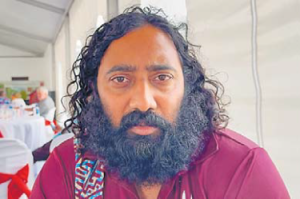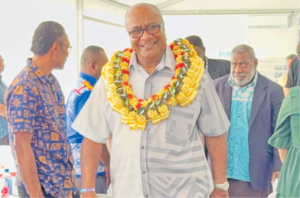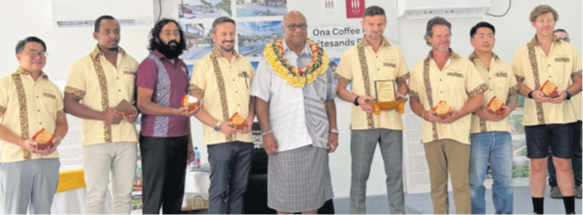Australia’s renowned specialty ONA Coffee invested a total $FJ1.2 million since its expansion to Fiji last year and has officially set up operation in Rakiraki this year.
ONA Coffee Fiji CEO Maheer Prasad revealed this to The Fiji Times in an interview where he highlighted the logistics of their expansion and additional planned programs.
ONA Coffee launched its coffee brand in Fiji at the Duadua Beach Resort in Rakiraki last Friday.
“We spent $FJ1.2m in the first year on the infrastructure that we needed to build,” Mr Prasad said.
He explained they planned to introduce a seedling program this year to assist farmers diversify their coffee varieties, and $1m will be allocated annually to source the coffee seedlings from overseas and into the country.
“Our key program now is our seedlings program, for that we’ll be paying $US200,000 a year for ONA to source us the best coffee from around the world to add to the seedling program that we currently have, which is based on historical coffee that’s in Fiji,” Mr Prasad said
At the rate of growth of the coffee industry in Fiji, he said it was forecast to surpass sugar and become the largest agricultural industry.
“We’ve reached higher levels already, the amount of land that we plant coffee on, the amount of land area that’s covered by that, and then within it, the amount of people that are approaching us and saying ‘I have these huge amounts of land, I really want to plant coffee on it’, that’s pushed us to these huge numbers that we’re talking about.
“We’re saying that because we’re projecting forward, we know how we can do it and it’s just a process.
“It’s significant for Fiji because as the sugar industry decreases in size, dropping down below the $F100m per year foreign revenue, we’re trending up and we would go up pretty quicky.
“So, you can see a point where coffee would surpass sugar as Fiji’s largest agricultural industry.”
Mr Prasad reaffirmed that ONA was very cautious that it does not expand in areas where local coffee producers were already established.
He said he had made a conscious decision not to venture into areas where local coffee producers were already established like Sigatoka and Nadi.
“I came to Ra instead, two reasons: one, because there were so many coffee companies there; the second reason is because Ra needed development.
“So, we’re working in Ra and a bit of Tailevu, an area that has had coffee for a long time but nobody’s buying coffee from, and we’re also pushing it to Vanua Levu and Taveuni, so that’s our next area that we’re going into.
“Our zone is in the north.
“So, the north of Viti Levu and northern Fiji, Vanua Levu and Taveuni, we’re not worried about trying to get into any other areas where other coffee companies are established.”
ONA Coffee’s recent expansion into the country has gained a lot of interest from landowners in the Ra province and nearby areas.
The CEO said because of increasing interests from farmers in the area, there would also be a demand for skills in order to meet the standards of coffee production.
He said ONA was now working directly with farmers to provide training and get farmers familiarised with coffee farming and potentially coffee processing in the country.
“What we would like to do is to create the coffee producing culture that you need in Fiji, but at the same time, the coffee consuming culture or cafe culture.
“Over time, we would have this huge amount of coffee production going on and that’s what we’re looking at doing now,” he said, confirming the training was expected to take place later this year.
According to ONA Coffee Fiji operations CEO, this country has the potential climate to grow Arabica, Liberica and Robusta, the world’s top three coffee varieties.
“Arabica is pretty well known, quite valuable and Liberica and Robusta is a little bit more special, unique.
“So, at the moment, it feels like there is a chance for the people that grow them and turn it into a very highly valued coffee in Fiji.
“ONA has really helped push Liberica onto the world stage and all of a sudden, everybody wants to buy more but there’s not enough.
“It’s really perfect for Fiji to find something that’s not just high value at the moment but has increasing value in the future.”
Mr Prasad said he envisioned Fiji’s coffee industry to be the most exciting coffee country in the world – one that contributes massively to the economy, generates employment and attract tourists and coffee drinkers from around the globe thus boosting the tourism industry.
“Fiji can be the most exciting coffee country in the world.
“We can have more tourists that come to spend more money and travel more because we have coffee now, rather than staying in resorts all the time.
“Those are all the things that I want to see in the long term.
“There’ll be coffee everywhere but the process of becoming that coffee country is one that I’m looking forward to seeing on the next few years,” he said.
The newly established Australian coffee company is now in the process of negotiations with Government and the private sector, landowners and farmers around the Ra, Tailevu, Vanua Levu and Taveuni areas to further develop the ONA coffee in the country.

Rakiraki last week. Picture: JOSEFA SIGAVOLAVOLA




